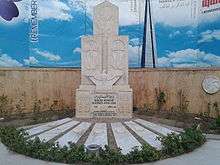Armenian Genocide Remembrance Day
| Genocide Remembrance Day | |
|---|---|
|
| |
| Observed by |
|
| Type | National |
| Significance | Commemoration of the Armenian Genocide |
| Date | 24 April |
| Next time | 24 April 2017 |
| Frequency | annual |
Armenian Genocide Remembrance Day (Armenian: Մեծ Եղեռնի զոհերի հիշատակի օր Mets Yegherrni zoheri hishataki or; Russian: Геноцид армян День памяти, Genotsid armyan Den' pamyati; Turkish: Ermeni Soykırımı Anma Günü) or Armenian Genocide Memorial Day[1] is a national holiday in Armenia and the Nagorno-Karabakh Republic and is observed by the Armenian diaspora on April 24.[1][2] It is held annually to commemorate the victims of the Armenian Genocide of 1915. In Yerevan, the capital of Armenia, hundreds of thousands of people walk to the Tsitsernakaberd Genocide Memorial to lay flowers at the eternal flame.
History

The date 24 April commemorates the deportation of Armenian intellectuals on 24 April 1915 from Constantinople (current Istanbul, Turkey). The first commemoration, organized by a group of Armenian Genocide survivors, was held in Istanbul in 1919 at the local St. Trinity Armenian church.[3] Many prominent figures in the Armenian community participated in the commemoration. Following its initial commemoration in 1919, the date became the annual day of remembrance for the Armenian Genocide.[3]
On 9 April 1975, the US House of Representatives passed Joint Resolution 148 designating 24 April as a National Day of Remembrance of Man’s Inhumanity to Man.[4]
The Resolution commemorated the victims of genocide, especially those of Armenian ancestry who succumbed to the genocide perpetrated in 1915, The resolution however failed to pass in the U.S. Senate Judiciary Committee due to President Gerald R. Ford’s strong opposition to what he saw as a threat to the country's strategic alliance with Turkey.[5]
In 1988, Soviet Armenia formally adopted 24 April as a public day of commemoration.[6]:215
In 1997 the California State Assembly declared 24 April as a Day of Remembrance for the Armenian Genocide of 1915–1923, and for the victims of the Sumgait Pogroms of 1988 and Baku Riots of 1990.[6]:232
The day is also chosen by Assyrian/Syriacs to commemorate the Assyrian Genocide especially in diaspora.
See also
- Armenian Genocide recognition
- "I Apologize" campaign
- Sorry Day
- Vergangenheitsbewältigung
- Truth and Reconciliation Commission
References
- 1 2 Jones, Adam (2010). Genocide: A Comprehensive Introduction. Taylor & Francis. p. 156. ISBN 9780203846964.
- ↑ Hovannisian, Richard G., ed. (1992). The Armenian Genocide: History, Politics, Ethics. Palgrave Macmillan. p. 339. ISBN 9780312048471.
- 1 2 "At the Origins of Commemoration: The 90th Anniversary Declaring April 24 as a Day of Mourning and Commemoration of the Armenian Genocide". Armenian Genocide Museum. 10 March 2009.
- ↑ Full text
- ↑ Gunter, Michael M. (15 April 2011). Armenian History and the Question of Genocide. Palgrave Macmillan. p. 76. ISBN 978-0-230-11059-5. Retrieved 23 April 2013.
- 1 2 Bloxham, Donald (28 April 2005). The Great Game of Genocide: Imperialism, Nationalism, and the Destruction of the Ottoman Armenians. Oxford University Press. ISBN 978-0-19-150044-2.
External links
| Wikimedia Commons has media related to Armenian Genocide Remembrance Day. |